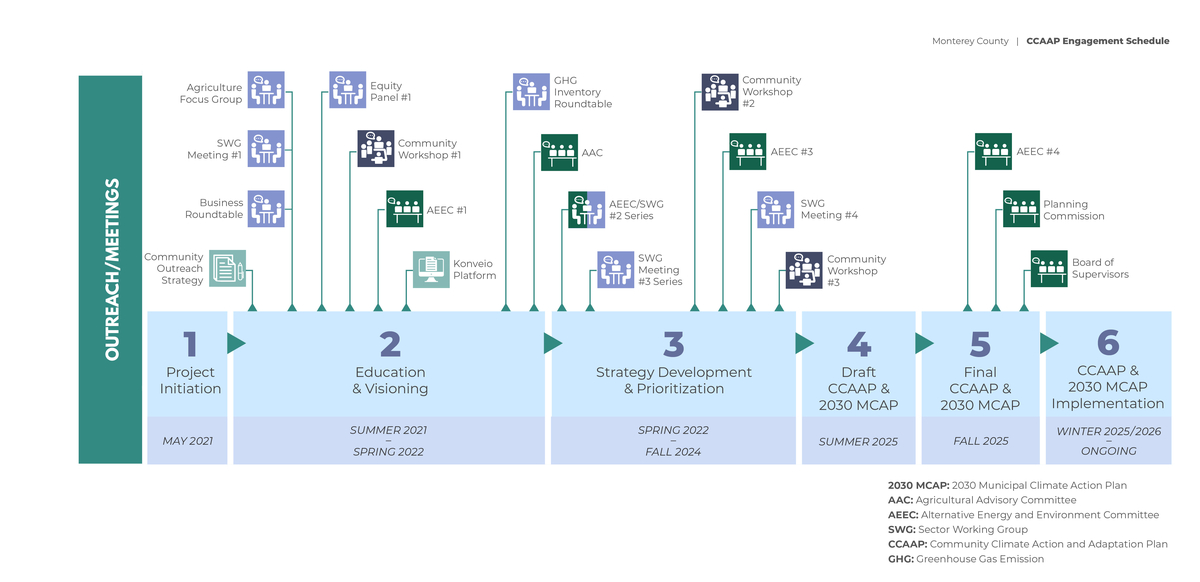Community engagement is at the heart of our climate action planning effort. We’re working with local businesses, advocates, and citizen groups to inform and prioritize the strategies that will make up the CCAAP. Through evidence-based research and expertise, deep stakeholder engagement, and a focus on inclusion and diversity, the CCAAP will incorporate meaningful and customized solutions and inspire strategic programmatic action. The sections below provide information about how the County is engaging various groups and the timing for upcoming meetings.
Events held during our Education & Visioning phase:
- Sector Working Group Meeting 1: October 21st, 2021
- Agriculture Focus Group Meeting 1: October 27th, 2021
- Business Roundtable Meeting 1: October 28th, 2021
- Community Workshop 1: November 16th, 2021
- Alternative Energy & Environment Committee: November 18th, 2021
- Equity Panel Meeting 1: December 10th, 2021
- Alternative Energy & Environment Committee: February 25th, 2022
- Alternative Energy & Environment Committee: March 24th, 2022
Events held during our Strategy Development & Prioritization phase:
- Special Alternative Energy & Environment Committee - Buildings & Energy: May 5th, 2022
- Special Alternative Energy & Environment Committee - Transportation & Land Use: May 6th, 2022
- Regularly Scheduled Alternative Energy & Environment Committee - Resource Consumption (Water & Waste): May 26th, 2022
- Special Alternative Energy & Environment Committee - Agriculture & Sequestration: June 22nd, 2022
- Agriculture Workshop Series
- Carbon Sequestration in Monterey County's Croplands: July 27th, 2022
- Carbon Sequestration in Monterey County's Vineyards: August 3rd, 2022
- Carbon Sequestration in Monterey County's Rangelands: September 22, 2022
- Community Workshop 2: September 29, 2022
- Community Workshop 3: December 4, 2024
Sector Working Groups
Sector Working Groups are groups that will focus on strategies for reducing emissions from a specific sector such as energy, buildings, transportation, agriculture and waste. The sector working groups are meant to assist County Sustainability staff in the development of strategies and key performance indicators to drive the County towards its sustainability goals. The groups will provide both historical reference and insight into the current situation of the particular sector and will build a bridge between the public and private sector in the development of the County’s Community Climate Action and Adaptation Plan (CCAAP). Working group members are knowledgeable in the topic area through either industry expertise, volunteer experience or educational background.
Currently, the Sector Working Group Meeting Schedule is as follows. This schedule will be updated.
- Meeting 1: October 21, 2021
- Meetings 2 & 3: Summer 2022
- Meeting 4: December 16, 2024
Agriculture Focus Group
The agriculture focus group was held with organizations that represent or work closely with the agriculture community. During the focus group, we sought feedback on challenges the agriculture community is facing in light of climate impacts, and opportunities for the County to provide support to this integral part of the county’s identity, economy, and culture. We also sought input on outreach and education materials to begin to inform the Climate Action Toolkit.
The agriculture focus group met on October 27, 2021.
Business Focus Group
The purpose of the business roundtable focus group was to act as an innovation generator and to connect what our businesses are already doing in the County to our goals and strategies within the plan. Businesses discussed past pitfalls or barriers to achieving climate action goals and the solutions that they have engineered. Importantly, the business roundtable served as a place to form the beginnings of private sector champions for the strategies and the Community Action Toolkit.
The business roundtable focus group met on October 28, 2021.
Equity Panel
An equity lens is a tool comprised of reflective questions and principals, intended to improve decision-making and lead to more equitable policies and programs. An Equity Panel will help to consider the equity implications of a strategy before that action is adopted as well as to consider the consequences as the strategy is implemented. The Equity Panel will meet in a similar fashion to the working groups, but the members will be composed of representatives from Community Based Organizations and their members.
Youth Commission
The Monterey County Youth Climate Action Council will meet regularly throughout the process and students will provide their input and vision for Monterey County in the year 2030.
The Sustainability team will lead presentations to and discussions with the Planning Commission, Alternative Energy and Environment Committee, and the Board of Supervisors. The engagement plan proposes presentations by the project team to the advisory bodies as informational or study session items during regularly scheduled meetings. The advisory body members will also be invited and encouraged to participate in all community activities. Advisory body engagement will occur during project initiation, policy and strategy development, and public review of the draft CCAAP. The County will follow the Brown Act for all meeting noticing.
Planning Commission and Alternative Energy and Environment Committee
The project team will meet with the Planning Commission and Alternative Energy and Environment Committee (AEEC) several times during CCAAP development. This includes meetings that provide an overview of the project, allow input on the vision, stakeholder engagement plan, and results of technical analyses. Additionally, AEEC will provide input into development GHG reduction strategies, sustainability strategies, and adaptation strategies and will hear feedback summaries from stakeholder engagement sessions. Once the CCAAP is made available for public review, the Planning Commission and AEEC will review the Climate Action Plan formally and provide a recommendation to the Board of Supervisors (BOS) during a public hearing.
The project team has presented to the AEEC at meetings held on the following dates:
- November 18, 2021
- February 25, 2022
- March 24, 2022
- May 5, 2022
- May 6, 2022
- May 26, 2022
- June 22, 2022
- January 10, 2024
- February 29, 2024
- December 17, 2024
- June 30, 2025
The project team anticipates providing additional presentations to the AEEC and Planning Commission.
Board of Supervisors
The BOS is responsible for reviewing and making a final decision to adopt or deny the CCAAP, and so a formal adoption hearing will be one of the final steps in the project.
Information updates and presentations will be made to the BOS during the planning process. The presentations will include: 1) project initiation (receive input on draft vision and engagement approach, including list of stakeholders); 2) policy and strategy development (present the draft findings of data analysis, updated vision and goals, and approach to strategy development, including benefits and tradeoffs); 3) presentation of the Public Review Draft Climate Action Plan; and 4) presentation of the Final Draft Climate Action Plan during a public hearing.
The project team presented to the BOS on August 30, 2022 and August 13, 2024.
Past presentations given to advisory bodies are available at the link below.
Community workshops provide an opportunity to inform, consult, involve, and collaborate. An agenda could include a presentation by the project team and/or community members, question and answer opportunities, trainings, and/or small or large group facilitated activities to present key project information and answer questions helpful to preparation of GHG reduction strategies, sustainability strategies, adaptation strategies, or implementation programs.
The first community workshop was held on November 16, 2021. The second community workshop was held on September 29, 2022 at the Marina Library. The final community workshop was held on December 4, 2024.
Click the button below to view materials from the community workshops.
The Technical Advisory Committee is intended to provide high-level technical expertise in emissions reductions strategies and will serve to provide feedback to the County on questions raised throughout the stakeholder engagement process. This group will meet early in the process to review the GHG inventory and initial strategies prior to stakeholder meetings. They will then continuously reevaluate the strategies throughout the process as more data and concerns arise. Members of this group will have a deep understanding of emissions reductions and sequestration strategies.
Within Monterey County there are 12 cities that represent 72% of the county's residents. The cities have varying levels of capability with respect to climate action planning, with some cities leading the way, and others lacking the resources dedicated to write or implement a CAP. The goal of multi-jurisdiction engagement is to bring the cities together at varying points throughout the County’s CAP process to see if there is any overlapping efforts or ways to share resources. While cities are more positioned to act on urban development to reduce emissions, the County has an opportunity to sequester carbon in its land and water sinks and take more regional action on issues like organics diversion from landfills. So, while the strategies to reduce emissions may end up looking very different from jurisdiction to jurisdiction, some of the stakeholder engagement feedback and processes may be transferrable. In addition, the technical work done to calculate GHG emissions reductions may also be shared leading to less expensive processes for all involved. In addition, coordinated efforts are needed to meet overall goals. For instance, education and outreach on energy efficiency, diversion of organics, and other measures can be developed together. Also, model ordinances can be shared across all jurisdictions where strategies are the same.
